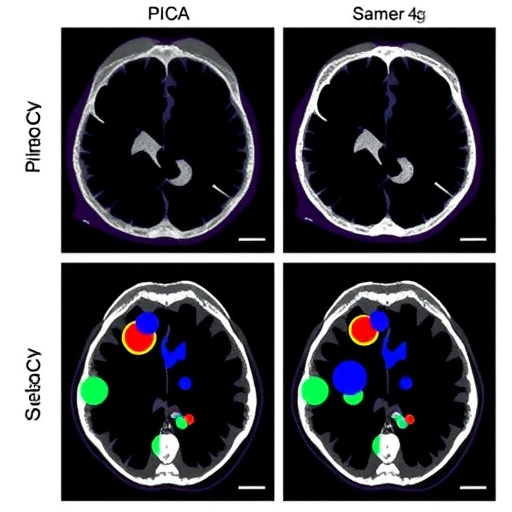
In an intriguing case that sheds light on the complexities of cancer treatment, researchers have documented the long-term survival of a patient diagnosed with a SMARCA4-deficient undifferentiated thoracic tumor that had metastasized to the brain. The study, conducted by a team led by Gan Y., Hu Q., and Hu F., offers a comprehensive review of the multimodal treatment strategies employed in this extraordinary clinical scenario. As the understanding of cancer biology and genetics advances, cases like these underscore the significance of personalized approaches to treatment that can lead to remarkable outcomes.
The case report reveals a patient whose tumor harbored a deficiency in the SMARCA4 gene, a critical player in chromatin remodeling and gene expression. The loss of SMARCA4 function is associated with aggressive cancer phenotypes, notably seen in thoracic tumors, which typically lead to poor prognoses and limited survival rates. This case provides an exception to the general trend, as the patient achieved long-term survival through an innovative blend of treatment modalities.
Highlighting the intersection between genetics and therapeutic intervention, the treatment approach was remarkably comprehensive. The team employed a multimodal strategy featuring surgery, chemotherapy, and targeted therapies, an approach that has become increasingly relevant in the fight against complex malignancies. The decision to employ such a diverse array of treatments reflects the notion that cancer cannot be treated with a one-size-fits-all approach, emphasizing instead the need for tailored treatments that consider individual genetic profiles and tumor characteristics.
One of the most compelling aspects of this case is the role that advanced surgical techniques played in the patient’s recovery. Surgical intervention remains a cornerstone in the management of localized tumors, particularly those characterized by metastatic spread. The surgical team undertook a complex resection of the primary thoracic tumor and successfully addressed the brain metastasis, a feat that is often fraught with complications. This aspect of the treatment underscores the importance of a multidisciplinary approach in oncology, where collaboration between surgeons, medical oncologists, and radiologists can significantly influence patient outcomes.
The addition of adjuvant chemotherapy and targeted therapies post-surgery cannot be overlooked. These methods aim to eradicate residual disease and prevent further metastasis. In this patient’s case, the use of specific agents targeting the molecular pathways influenced by the SMARCA4 deficiency may have been critical in improving survival rates. The integration of precision medicine, where treatment is customized based on the tumor’s genetic and molecular characteristics, represents a significant advancement in oncological care.
Moreover, the team’s literature review accompanying the case report presents a broader context for the discussion of SMARCA4-deficient tumors. As the authors sifted through existing cases and pertinent research, they identified key trends and outcomes that were instrumental in shaping their treatment strategy. This underscores the vital role of data accumulation and shared knowledge in accelerating treatment innovation in oncology.
In addition to the immediate clinical implications, this case opens avenues for future research. The persistence of SMARCA4-deficient tumors poses unique challenges that warrant investigation into novel therapeutic agents and treatment protocols. With an expanded understanding of tumor biology, researchers are fueled to explore new drug formulations or innovative combinations that could enhance therapeutic efficacy while minimizing adverse effects.
Furthermore, the psychological and emotional aspects of cancer treatment cannot be forgotten. The journey of battling a malignancy has profound impacts on both patients and their families. The successful management of such an aggressive form of cancer provides not just hope but a renewed perspective on survivorship. The commitment of the healthcare team in supporting the patient through rigorous treatment signifies the importance of holistic care in conjunction with technical medical advancements.
As the scientific community grapples with the evolution of cancer therapies, this case reinforces crucial lessons regarding the resilience of patients and the adaptive capabilities of modern medicine. Each story of survival contributes to the larger narrative of cancer research and treatment innovation. The partnership of researchers, clinicians, and patients stands as a testament to what can be achieved through perseverance, collaboration, and an unwavering commitment to advancing medical science.
In conclusion, the case of the SMARCA4-deficient thoracic tumor is not merely a report of medical achievement; it serves as a beacon of hope. It encourages researchers to continue pursuing advancements in cancer treatment and inspires patients facing dire prognoses to remain resilient. As this remarkable case is disseminated through academic channels, it underscores the importance of continued dialogue in the medical community about unconventional approaches to cancer management. Such stories are the cornerstone of progress in the constant battle against this challenging disease.
The implications of this research extend beyond the individual case, offering the potential for impactful changes in treatment protocols and survival outcomes for patients with similar diagnoses. This case stands as a reminder of the evolving nature of cancer therapies, emphasizing that with the right approach, even the most formidable cancers can be confronted head-on and overcome.
Finally, the patient’s remarkable story, interwoven with groundbreaking treatment strategies, invites the medical community to reflect on the boundaries of current understanding and to push those boundaries further in the quest for comprehensive cancer care.
Subject of Research: SMARCA4-deficient cancer treatment approaches
Article Title: Long-term survival of a SMARCA4-deficient undifferentiated thoracic tumor with brain metastasis successfully treated with multimodal treatment: a case report and literature review
Article References:
Gan, Y., Hu, Q., Hu, F. et al. Long-term survival of a SMARCA4-deficient undifferentiated thoracic tumor with brain metastasis successfully treated with multimodal treatment: a case report and literature review.
J Cancer Res Clin Oncol 151, 234 (2025). https://doi.org/10.1007/s00432-025-06284-w
Image Credits: AI Generated
DOI: 10.1007/s00432-025-06284-w
Keywords: SMARCA4-deficiency, thoracic tumor, multimodal treatment, brain metastasis, cancer survival, personalized medicine
Tags: cancer biology advancementschemotherapy and surgery in cancerchromatin remodeling in tumorsgenetics and cancer therapyinnovative cancer treatment approacheslong-term survival in cancer patientsmultimodal cancer therapypatient outcomes in rare tumorspersonalized cancer treatment strategiesSMARCA4-deficient tumor treatmenttargeted therapies for aggressive cancerthoracic tumor case study




